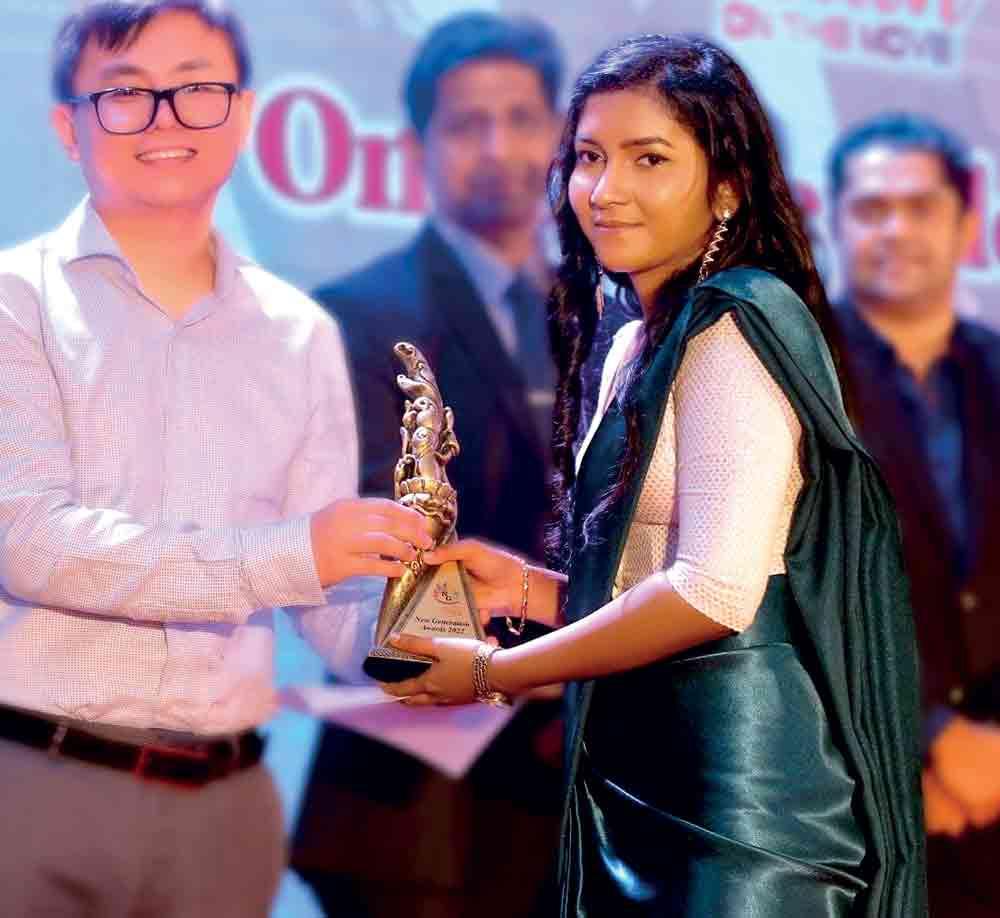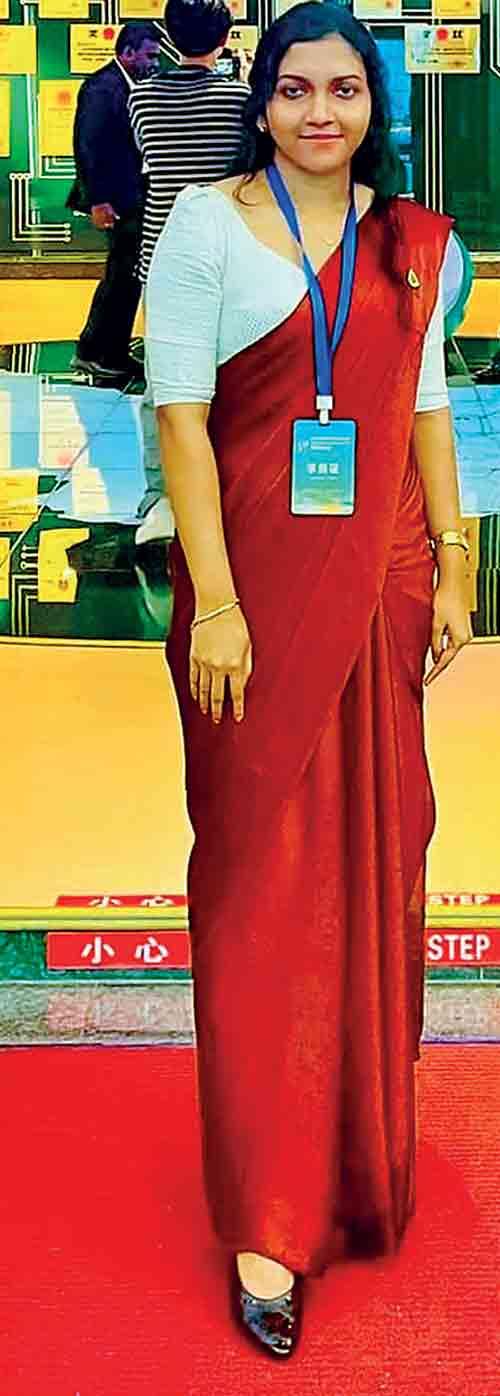
 At just 27, Muditha Rasanjalee is redefining what it means to be a modern entrepreneur in Sri Lanka’s agricultural and wellness sectors. As the founder of TRN Ceylon Agri (Pvt) Ltd and co-founder of several other ventures, she blends ancestral wisdom with cutting-edge innovation to create inclusive platforms that empower both people and the planet. Raised in a family steeped in agricultural tradition, Muditha transformed her parents’ modest plant nursery into a nationwide business, then into an international brand. From YouTube videos that demystify home gardening to launching e-commerce platforms catering to rural entrepreneurs, her journey is marked by resilience, creativity, and a deeply rooted sense of purpose. In this exclusive interview, Muditha opens up about her inspirations, the challenges of scaling globally, and what it takes to be a young woman leading change in a traditionally male-dominated industry.
At just 27, Muditha Rasanjalee is redefining what it means to be a modern entrepreneur in Sri Lanka’s agricultural and wellness sectors. As the founder of TRN Ceylon Agri (Pvt) Ltd and co-founder of several other ventures, she blends ancestral wisdom with cutting-edge innovation to create inclusive platforms that empower both people and the planet. Raised in a family steeped in agricultural tradition, Muditha transformed her parents’ modest plant nursery into a nationwide business, then into an international brand. From YouTube videos that demystify home gardening to launching e-commerce platforms catering to rural entrepreneurs, her journey is marked by resilience, creativity, and a deeply rooted sense of purpose. In this exclusive interview, Muditha opens up about her inspirations, the challenges of scaling globally, and what it takes to be a young woman leading change in a traditionally male-dominated industry.
Q What inspired you to start your journey as an entrepreneur, especially in agriculture and authentic Sri Lankan products?
I grew up in a business-oriented family. My parents ran a plant nursery, so I was surrounded by greenery, hands-on learning, and the rhythm of nature. After my A/Ls, I began studying agriculture at a government campus, but a sudden illness forced me to take a break. During that time, I switched to a degree in business studies, which gave me new insights into entrepreneurship. I experimented with several small online businesses, fashion, accessories, but they didn’t take off. Then came the COVID-19 pandemic. While working from home, I had the chance to closely observe how my parents were still running their nursery, and I noticed a significant surge in the demand for local medicinal plants. Many people didn’t know how to identify or grow them. That’s when I decided to take my parents’ knowledge to the world. I started a YouTube channel with my father to educate beginners about agriculture and endangered local plants. Today, we have nearly 500,000 subscribers. That demand led us to build a website, expand our family partnership into a private limited company, and officially begin our journey in agriculture.
Sustainable entrepreneurship in rural Sri Lanka is about building businesses that uplift people, protect the environment, and preserve our cultural legacy. It means using local resources wisely, encouraging small-scale farmers and artisans, and investing in renewable solutions like solar energy.
Q You’ve established businesses both in Sri Lanka and the UK. What was the most challenging part of expanding internationally?
Sri Lanka is a treasure trove of resources. But when you aim to bring Sri Lankan products to an international audience, you quickly realize that the global market is not a single entity; it’s made up of people from different cultures, with varied preferences and expectations. Although I used digital tools and e-commerce to scale our business across Sri Lanka, stepping into international markets meant learning and adapting at a whole new level. The biggest challenge was understanding consumer behaviour in each region. That’s why we decided to launch our UK operations in stages, starting with an e-commerce platform tailored to that country. It allowed us to learn, test, and grow sustainably. Localization, compliance, and quality assurance are key when scaling globally.
Q Many shy away from agriculture due to its perceived limitations. What made you see it as an opportunity?
Agriculture is the root of countless industries. It’s not just about growing crops, it provides the raw materials for food, clothing, wellness, and more. Many people have a limited view of agriculture, seeing it as physically demanding or outdated. But today, agriculture is a highly advanced field. Smart agriculture, automation, and climate-resilient practices are changing the game worldwide. To me, agriculture is multidisciplinary. From growing to processing to delivering a product, it connects people, science, business, and technology. I saw it as an opportunity not just to create products but also to inspire a new generation to reconnect with nature and food production, especially after seeing how people turned to home gardening during lockdowns. Agriculture will remain the first and last industry as long as human life continues.

Q How do you define sustainable entrepreneurship in the context of Sri Lanka’s rural economy?
Sustainable entrepreneurship in rural Sri Lanka is about building businesses that uplift people, protect the environment, and preserve our cultural legacy. It means using local resources wisely, encouraging small-scale farmers and artisans, and investing in renewable solutions like solar energy. But to truly be sustainable, we must also empower youth. Education is key, giving young people the knowledge and tools to use modern technology to take village-level businesses to the world. Involving the community, building transparent supply chains, and ensuring everyone benefits from growth is the model we try to follow. True sustainability goes beyond profitability, it’s about long-term value for everyone involved.
Q Your brands reflect Sri Lankan tradition, well-being, and sustainability. How do you balance modern marketing with cultural authenticity?
Modern marketing is fast and digital, but authenticity is timeless. For us, it’s never just about pushing a product; it’s about storytelling. We aim to share the why behind what we do: the traditions, the uses of medicinal plants, the wisdom of our ancestors. That emotional connection builds trust and long-term loyalty. Social media plays a big role here. It allows us to reach global audiences while staying rooted in our identity. However, I always say, social media alone isn’t a business. It’s a tool. When used correctly, it supports your purpose. That’s why we focus on high-quality content, education, and community engagement. We want our audience to feel like they are part of something meaningful.
Q As a young woman entrepreneur, have you faced any stereotypes or barriers? How did you overcome them?
Absolutely. Especially in agriculture and family business settings, many people doubted me, more so because I was a young woman without a ‘formal job’. People didn’t take me seriously at first. Some thought I was just playing around. But I stayed focused. I kept learning, improving, and delivering results. I built confidence through experience and built networks that supported me. Once people see your consistency and commitment, they begin to respect you, regardless of age or gender. You don’t have to fit into a mold to succeed, you just have to believe in what you’re doing and show up every day with purpose.
Modern marketing is fast and digital, but authenticity is timeless. For us, it’s never just about pushing a product; it’s about storytelling. We aim to share the why behind what we do: the traditions, the uses of medicinal plants, the wisdom of our ancestors.
Q What are your personal thoughts on marriage and commitment in relationships as a young woman balancing ambition and tradition?
Sri Lanka’s traditions are beautiful, and I truly respect them. But I also believe in living in the moment and being fully present. When you’re focused on the now, you’re better equipped to balance personal and professional life. Marriage and relationships are deeply personal choices, and every woman should have the freedom to decide what works best for her. For me, the goal is to be able to grow personally and professionally; without compromising either. That balance is possible when there’s mutual respect, open communication, and shared values.
Q What’s your perspective on the relevance of family businesses in an era dominated by global corporations and rapid innovation?
Family businesses are essential because they carry history, tradition, and trust. They often have deep roots in local communities, which gives them a unique advantage. But staying relevant requires evolution. We must embrace technology, innovation, and education. For example, using digital platforms, modern packaging, and global logistics can elevate a family business to new heights. It’s also important to involve younger generations, who bring fresh perspectives and ideas. By combining tradition with innovation, family businesses can thrive in a competitive world without losing their identity.

Q In what ways has your involvement with Women in Management and the recognition as a Youth Top40 winner empowered your journey through networking?
We all have stories, but we don’t always get the chance to tell them. Being part of Women in Management and receiving the Youth Top40 award gave me a voice. These recognitions validated my efforts and gave me the confidence to share my journey more openly. They also connected me to an incredible network of mentors, peers, and industry leaders. Every person I’ve met through these platforms has contributed to my learning and growth. They’ve inspired me to keep going and reminded me why it’s so important to lift others up as we climb. Most importantly, these experiences strengthened my commitment to youth leadership and women’s empowerment. I want other young women, especially those in rural areas, to see that their dreams are valid and achievable.
Q If you could give one piece of advice to young entrepreneurs, especially young women in rural Sri Lanka, what would it be?
Start small but start now. Don’t wait for the perfect idea, partner, or time. Use what you have, where you are. Focus on solving real problems and giving back to your community. Entrepreneurship is not just about profit; it’s about creating impact. To the young women out there: your voice matters, your dreams matter, and your contribution is valuable. Don’t let fear or stereotypes hold you back. Be bold, stay grounded, and believe in your ability to shape the future. Small, consistent actions can create powerful ripple effects.
RAPID FIRE ROUND
- Tea or Coffee? Ceylon Tea
- Morning person or night owl? Night Owl
- One word to describe yourself: Innovative
- Instagram or LinkedIn? LinkedIn
- A businesswoman you admire: Indra Nooyi
- A country you dream of expanding your brand to: USA
- Traditional markets or digital stores? Digital Stores
- Most used app on your phone: WhatsApp
- A phrase you live by: “Never give up.”
- What’s next for Muditha; in one sentence: Turning dreams into reality.












